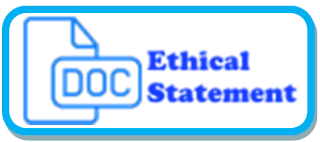Theo-Anthropocentric Paradigm on Qur’anic Interpretation in the Modern-Industrial Era; A Review of Cultural Interpretation by Cliffort Geertz
Abstract
Keywords
Full Text:
PDFReferences
Abdullah, Amin. Falsafah Kalam Di Era Postmodernisme. Yogyakarta: Pustakan Pelajar, 1995.
Abdullah, Amin, Hamim Ilyas, Khoiruddin Nasution, Suryadi, Rajasa Mu’tasim, Fahruddin Faiz, and Aris Fauzan. Rekonstruksi Ilmu-Ilmu Agama Islam. 1st ed. Yogyakarta: Pascasarjana UIN Sunan Kalijaga, 2014. https://digilib.uin-suka.ac.id/id/eprint/20036/1/M.%20AMIN%20ABDULLAH%20-%20REKONSTRUKSI%20ILMU-ILMU%20AGAMA%20ISLAM.pdf.
Abdurrahman, Moeslim. Islam Yang Memihak. Yogyakarta: LKiS, 2005.
Ahimsa-Putra, Heddy Shri. ‘The Living al-Qur’an: Beberapa Perspektif Antropologi’. Walisongo: Jurnal Penelitian Sosial Keagamaan 20, no. 1 (30 May 2012): 235–60. https://doi.org/10.21580/ws.20.1.198.
Ash-Shiddiqieqy, M. Hasbi. Falsafah Hukum Islam. Jakarta: Bulan Bintang, 1993.
Azizi, A. Qodri. Melawan Globalisasi. 3rd ed. Yogyakarta: Pustaka Pelajar, 2004.
Daya, Burhanuddin. ‘Al-Qur’an Dan Pembinaan Budaya (Perspektif Agamis)’. In Alqur’an Dan Pembinaan; Dialog Dan Transformasi, edited by Abdul Basir Solissa. Yogyakarta: LESFI, 1993.
E., Cassirer. An Essay on Man. New Haven: Yale University Press, 1945.
Fyzee, A.A.A. Kebudayaan Islam (Asal-Usul Dan Perkembangannya). Yogyakarta: Bagus Arafah, 1982.
Geertz, Clifford. Tafsir Kebudayaan Clifford Geertz. Translated by Fransisco Budi Hardiman. 1st ed. Yogyakarta: Kanisius, 1992.
———. The Interpretation of Culture. New York: Basic Books, 1970.
Ghazali, Muhammad al-. Berdialog Dengan Al-Qur’an. Translated by Maskur Hakim and Ubaidillah. Bandung: Mizan, 1996.
Habibi, M Dani. ‘Interpretasi al-Qur’an Surat al-Maidah Ayat 51 (Aplikasi Teori Penafsiran Hermeneutika Jorge J.E. Gracia)’. Substantia 21, no. 1 (2019): 17–28. http://dx.doi.org/10.22373/substantia.v21i1.4455.
Harb, Ali. Kritik Nalar Alqur’an. 2nd ed. Yogyakarta: LKiS, 2003.
Hendropuspito, Oc.D. Sosiologi Sistematik. Yogyakarta: Kanisius, 1989.
Ihsanudin, Ihsanudin. ‘Polemik “Tulisan Arab” Pada Busana Agnes Monica (Analisis Teori Interaksionisme Simbolik)’. Palita: Journal of Social-Religion Research 4, no. 1 (25 April 2019): 47–60. https://doi.org/10.24256/pal.v4i1.526.
Ilyas, Hamim. ‘Tafsir Al-Qur’an Berkerangka Kebudayaan’. Presented at the Seminar Regional Pengembangan Prodi IAT STAIN Salatiga, Salatiga, Desember 2013.
Izutsu, Tosihiku. Etika Keberagamaan Dalam Al-Qur’an. 2nd ed. Jakarta: Pustaka Firdaus, 1995.
Jabiri, Muhammad Abeed al-. Post Tradisionalisme Islam. Translated by Ahmad Baso. Yogyakarta: LKiS, 2000.
Karim, Khalil Abdul. Syari’ah: Sejarah Perkelahian Pemakanaan. Yogyakarta: LKiS, 2003.
Koentjaraningrat. Kebudayaan Jawa. Jakarta: Balai Pustaka, 1984.
Nasution, Harun. ‘Tinjauan Filosofis Tentang Pembentukan Kebudayaan Dalam Islam’. In Alqur’an Dan Pembinaan; Dialog Dan Transformasi, edited by Abdul Basir Solissa. Yogyakarta: LESFI, 1993.
Rahardjo, M. Dawam. Islam Dan Transformasi Budaya. Yogyakarta: Dana Bhakti Prima Yasa, 2002.
Riady, Ahmad Sugeng. ‘Agama dan Kebudayaan Masyarakat Perspektif Clifford Geertz’. Jurnal Sosiologi Agama Indonesia (JSAI) 2, no. 1 (30 March 2021): 13–22. https://doi.org/10.22373/jsai.v2i1.1199.
Saraswati, Destriana. ‘Pluralisme Agama Menurut Karen Armstrong’. Jurnal Filsafat 23, no. 3 (Desember 2013): 13.
Stearns, Peter N., ed. The Encyclopedia of World History: Ancient, Medieval, and Modern, Chronologically Arranged. Boston: Houghton Mifflin Company, 2001.
Sutiyono. Benturan Budaya Islam: Puritan Dan Sinkretis. Jakarta: Penerbit Buku Kompas, 2010.
Syarifuddin, Amir. Ushul Fiqh I. Jakarta: Logos, 1997.
Toynbee, Arnold. A Study of History. London: Oxford University Press, 1960.
Wijaya, Aksin. ‘Relasi Al-Qur’an Dan Budaya Lokal (Sebuah Tatapan Epistemologis)’. Presented at the Seminar Nasional UIN Sunan Kalijaga, Yogyakarta, n.d.
Yaser, Muhammad. ‘Memperkenalkan Tilawah Langgam Jawa’. In ARICIS, 1:394–407. UIN Ar-Raniri Banda Aceh, 2015. https://jurnal.ar-raniry.ac.id/index.php/aricis/article/download/961/768.
Zayd, Nasr Hamid Abu. Mafhum Al-Nas: Dirasah Fi ‘Ulum AI-Qur’An. 2nd ed. Beirut: al-Markaz al-Thaqafi al-’Arabi, 1994.
———. Teks Otoritas Kebanaran. Edited by Sunarwoto Dema. Yogyakarta: LKiS, 2003.
DOI: https://doi.org/10.18326/mlt.v8i1.8860
Refbacks
- There are currently no refbacks.
-----------------------------------------------------------------------------------------------------------------------
Institut Agama Islam Negeri (IAIN) Salatiga
Jl. Nakula Sadewa V No. 9, Kota Salatiga, Jawa Tengah 50722
Lt. 2 Gedung Skretariat Fakultas Ushuluddin Adab dan Humaniora












